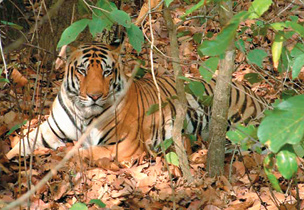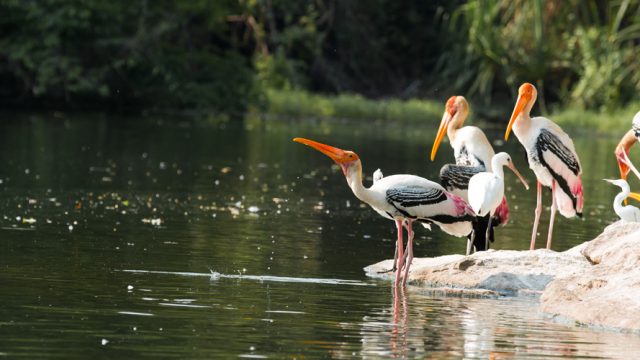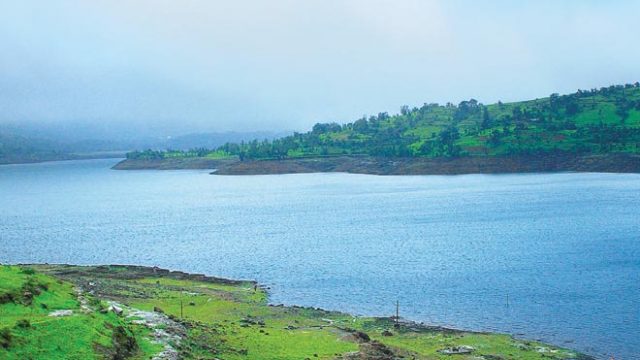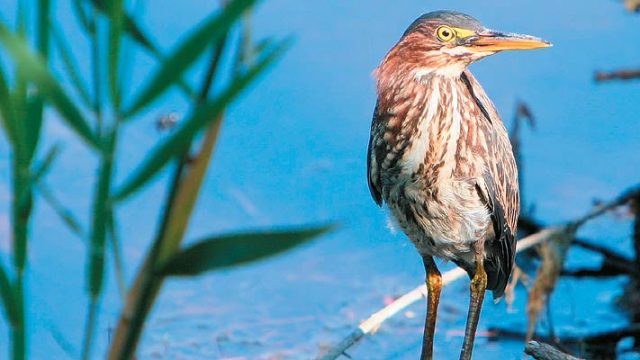Fast facts
State: Maharashtra
Distance: 637 km NE of Mumbai
When to go: Open from
Wildlife/ Forest Dept Office: Field Director, Project Tiger, Melghat Tiger Reserve, East Melghat Division, Amravati-444602
Tel: 0721-2662792(Amravati ); 07223-220214(Paratwada)
STD codes: Amravati – 0721; Paratwada – 07223
Getting there
Rail: Nearest railhead is Badnera (110 km/3 hrs).
Road: NH3 to Nashik via Igatpuri; NH6 till the exit to MSH8 ahead of Bhusawal, MSH8, 203 and 204 onto the reserve
Melghat was declared a Tiger Reserve in 1974, and was one of the first nine reserves that were notified under Project Tiger India’s foremost wildlife conservation project put in place in 1972 to protect the Bengal Tiger. Melghat means ‘a confluence of the Ghats’ and the area’s rugged topography is characterised by steep cliffs and rocky ravines, providing the reserve natural protection from encroachers. The reserve extends across 1,677 sq km. The core area, the Gugarnal National Park, has an extent of 361.28 sq km, and the buffer area of the reserve, the Melghat Tiger Sanctuary, spans approximately 788.28 sq km. Eco-development activities have been taken up consistently by the state and various organisations, resulting in an increase in the tiger population.
River Tapi marks Melghat’s northern boundary. Five tributaries from the Melghat region drain into the Tapi: Khandu, Khapara, Sipna, Gadga and Dola. Two state highways Paratwada to Burhanpur and Akot to Harisal Ñ pass through the reserve. It stretches from Rangubeli and Hatru to the north, to Jarida and Chunkhadi to the east, Kolkas, Tarubanda and Dhakna to the west, and Dhargad and Gullarghat to the south. Semadoh is the entry point if you are coming via the Paratwada-Dharni State Highway. If youÕre travelling from Madhya Pradesh, the entry point is Harisal, located 25 km from Semadoh.
The reserve area has been divided into three different zones. The safari begins from Semadoh, which has a Tourist Complex. It houses the Nature Interpretation Complex, a centre for information, and has accommodation facilities. It is the starting point for jungle safaris and trekking arrangements as well as elephant rides can also be organised here.

Things to See and Do
Jeep safaris are conducted only from December till the beginning of the monsoon. You can travel on the safari trail by the mini-buses arranged by the Forest Department or by your own vehicle. The jeep safari starts from Semadoh; there are two safaris a day and the timings usually depend on the bookings made. The first usually starts at 6.00am and the evening safari begins at 4.00pm. The safari starts only after the jeep is full. The other alternative is to pay the cost of the entire jeep. If you travel in a private vehicle, you’ll have to take a forest guide along. There are many trekking routes along the Sipna river with plenty of scope for birdwatching. Most of the reserve is flat land with very few climbs. Therefore, Melghat lends itself easily to treks.
Where to Stay and Eat
The Forest Department here offers a range of accommodation. The Semadoh Tourist Complex (Forest Development Corporation Office, Nagpur Tel: 0712-2226761; Tariff: INR 1,050, INR 50 per dorm bed) has huts and dorms. Rooms have attached baths and running hot water. You may want to carry your own towels and sheets, as well as mosquito repellent as a precaution.
The Kolkas Rest House (FDC Nagpur, Tel: 2226761; Tariff: INR 1,050), situated in the park, offers the best view of the surrounds and is a much better option than the Semadoh dorms. To stay here, book online at mahecotourism.gov.in.
There are several other Forest Rest Houses (Tel: 07223-220214; Tariff: Govt INR 80, Private INR 450, Vehicle Permit INR 350) within the park, at Chaurakund, Raipur, Hatru and Chunkhadi. To book any of these, contact DCF Sipna Wildlife Division, Paratwada.
The Dhakna, Tarobanda and Harisal Forest Rest Houses (Tel: 07223-222643; Tariff: INR 400) can all be booked through the DCF Gugamal Wildlife Division in Paratwada.
Huts and tents at Shahnoor, Gullarghat and Dhargad (Tel: 07258-281011; Tariff: INR 450) can be booked via the DCF Akot Wildlife Division, Akot. Simple meals can be arranged at the forest rest houses.
Food is available at the Semadoh Guest House, although non-vegetarian food and alcohol aren’t allowed. The chef’s repertoire is limited, so you will have to subsist on plain vegetarian food. You might want to carry snacks with you. The Semadoh Complex has a canteen that serves simple vegetarian fare.
Mumbai
tiger reserve
trekking





